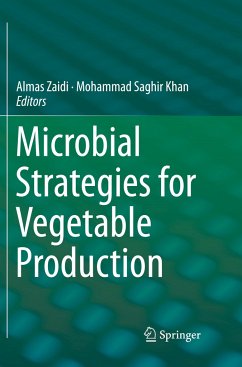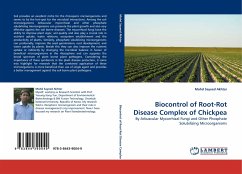Microbial Strategies for Vegetable Production
Herausgegeben:Zaidi, Almas; Khan, Mohammad Saghir
Microbial Strategies for Vegetable Production
Herausgegeben:Zaidi, Almas; Khan, Mohammad Saghir
- Broschiertes Buch
- Merkliste
- Auf die Merkliste
- Bewerten Bewerten
- Teilen
- Produkt teilen
- Produkterinnerung
- Produkterinnerung
This book provides a comprehensive information on basic and applied concepts of microbesial strategies adopted for the improvement of vegetables grown in various production systems. The beneficial role of soil microbes including plant growth promoting rhizobacteria (PGPR), nitrogen fixers, and phosphate-solubilizing bacteria in the improvement of vegetables grown both in normal and contaminated soils is discussed. The role of PGPR in tomato production is dealt separately. The impact of heavy metals on different vegetables and abatement of metal toxicity following metal tolerant PGPR and their…mehr
Andere Kunden interessierten sich auch für
![Metabolomics, Proteomes and Gene Editing Approaches in Biofertilizer Industry Metabolomics, Proteomes and Gene Editing Approaches in Biofertilizer Industry]() Metabolomics, Proteomes and Gene Editing Approaches in Biofertilizer Industry134,99 €
Metabolomics, Proteomes and Gene Editing Approaches in Biofertilizer Industry134,99 €![Metabolomics, Proteomes and Gene Editing Approaches in Biofertilizer Industry Metabolomics, Proteomes and Gene Editing Approaches in Biofertilizer Industry]() Metabolomics, Proteomes and Gene Editing Approaches in Biofertilizer Industry139,99 €
Metabolomics, Proteomes and Gene Editing Approaches in Biofertilizer Industry139,99 €![Grand Challenges in Marine Biotechnology Grand Challenges in Marine Biotechnology]() Grand Challenges in Marine Biotechnology113,99 €
Grand Challenges in Marine Biotechnology113,99 €![Modern Tools and Techniques to Understand Microbes Modern Tools and Techniques to Understand Microbes]() Modern Tools and Techniques to Understand Microbes112,99 €
Modern Tools and Techniques to Understand Microbes112,99 €![Membrane Separation of Food Bioactive Ingredients Membrane Separation of Food Bioactive Ingredients]() Membrane Separation of Food Bioactive Ingredients127,99 €
Membrane Separation of Food Bioactive Ingredients127,99 €![Membrane Separation of Food Bioactive Ingredients Membrane Separation of Food Bioactive Ingredients]() Membrane Separation of Food Bioactive Ingredients127,99 €
Membrane Separation of Food Bioactive Ingredients127,99 €![Biocontrol of Root-Rot Disease Complex of Chickpea Biocontrol of Root-Rot Disease Complex of Chickpea]() Mohd Sayeed AkhtarBiocontrol of Root-Rot Disease Complex of Chickpea38,99 €
Mohd Sayeed AkhtarBiocontrol of Root-Rot Disease Complex of Chickpea38,99 €-
-
-
This book provides a comprehensive information on basic and applied concepts of microbesial strategies adopted for the improvement of vegetables grown in various production systems. The beneficial role of soil microbes including plant growth promoting rhizobacteria (PGPR), nitrogen fixers, and phosphate-solubilizing bacteria in the improvement of vegetables grown both in normal and contaminated soils is discussed. The role of PGPR in tomato production is dealt separately. The impact of heavy metals on different vegetables and abatement of metal toxicity following metal tolerant PGPR and their consequential impact on vegetables grown in metal polluted soil is discussed. Moreover, recent advances in the management of vegetable diseases employing PGPR are addressed. This volume is therefore of special interest to both academics, professionals and practitioners working in the field of vegetable farming/horticulture, microbiology and plant protection sciences.
Produktdetails
- Produktdetails
- Verlag: Springer / Springer International Publishing / Springer, Berlin
- Artikelnr. des Verlages: 978-3-319-85386-4
- Softcover reprint of the original 1st ed. 2017
- Seitenzahl: 240
- Erscheinungstermin: 1. August 2018
- Englisch
- Abmessung: 235mm x 155mm x 13mm
- Gewicht: 414g
- ISBN-13: 9783319853864
- ISBN-10: 3319853864
- Artikelnr.: 53576238
- Herstellerkennzeichnung Die Herstellerinformationen sind derzeit nicht verfügbar.
- Verlag: Springer / Springer International Publishing / Springer, Berlin
- Artikelnr. des Verlages: 978-3-319-85386-4
- Softcover reprint of the original 1st ed. 2017
- Seitenzahl: 240
- Erscheinungstermin: 1. August 2018
- Englisch
- Abmessung: 235mm x 155mm x 13mm
- Gewicht: 414g
- ISBN-13: 9783319853864
- ISBN-10: 3319853864
- Artikelnr.: 53576238
- Herstellerkennzeichnung Die Herstellerinformationen sind derzeit nicht verfügbar.
Almas Zaidi, received her M.Sc. and Ph.D. (Agricultural Microbiology) from Aligarh Muslim University, Aligarh, India and currently serving as Guest teacher/Assistant Professor at the Department of Agricultural Microbiology, Aligarh Muslim University, Aligarh, India. Dr. Zaidi has been teaching Microbiology at post graduate level for the last 12 years and has research experience of 16 years. She has published above 50 research papers, book chapters and review articles in journals of national and international repute. Dr. Zaidi has edited seven books published by the leading publishers. Her main focus of research is to address problems related with rhizo-microbiology, microbiology, environmental microbiology, and biofertilizer technology. Mohammad Saghir Khan, Ph.D. is a Professor at the Department of Agricultural Microbiology, Aligarh Muslim University, Aligarh, India. Dr. Khan received his M.Sc. from Aligarh Muslim University, Aligarh, India and his Ph.D. (Microbiology) from Govind Ballabh Pant University of Agriculture & Technology, Pantnagar, India. He has been teaching Microbiology to post-graduate students for the last 20 years and has research experience of 24 years. In addition to his teaching, Dr. Khan is engaged in guiding students for their doctoral degree in Microbiology. He has published over 100 scientific papers including, original research articles, review articles and book chapters in various national and international publication media. Dr. Khan has also edited nine books published by the leading publishers. Dr. Khan is deeply involved in research activities focusing mainly on rhizobiology, microbiology, environmental microbiology especially heavy metals-microbes-legume interaction, bioremediation, pesticide-PGPR-plant interaction, biofertilizers and rhizo-immunology.
Part 1. Microbial Inoculants in Organic Vegetable Production: Current Perspective.- 1. Introduction.- 2. Need of organic vegetables.- 3. Essential characteristics of organic farming systems.- 4. Microbial inoculants as components of organic production.- 5. Microbes as bio-control agents for suppression of plant diseases.- 6. Microbes for decomposition of organic residues.- 7. Factors affecting the efficacy of microbial inoculants.- Part 2. Plant growth promoting bacteria: Importance in vegetable production.- 1. Introduction.- 2. Place of PGPR in Food safety and agricultural challenges.- 3. Mechanism of growth promotion by PGPR-A general perspective.- 4. PGPR-hydrolytic enzymes.- 5. Systemic tolerance and systemic resistance induction by PGPR.- Part 3. Role of Nitrogen Fixing Plant Growth Promoting Rhizobacteria in Sustainable Production of Vegetables: Current Perspective.- 1. Introduction.- 2. Rationale for using nitrogen fixers in vegetable production.- 3. Nitrogen fixers-VegetableInteractions: How nitrogen fixers enter vegetables.- 4. Mechanism of vegetable Growth Promotion by nitrogen fixing plant growth promoting rhizobacteria.- 5. Nitrogen fixing plant growth promoting rhizobacteria improve vegetable production: A general perspective.- 6. Effects of nitrogen fixing plant growth promoting rhizobacteria on important vegetable crops.- Part 4. Role of Plant growth Promoting rhizobacteria (PGPR) in the improvement of vegetable crop production under stress conditions.- 1. Introduction.- 2. Stress factors.- Part 3. Drought.- 4. Alleviation of drought and salinity stress by plant growth promoting rhizobacteria.- Part 5. Growth improvement and management of vegetable diseases by plant growth promoting rhizobacteria.- 1. Introduction.- 2. Rationale for using PGPR in the Management of Vegetables Diseases.- 3. How plant growth promoting rhizobacteria combat phytopathogen attack: A general perspective.- 4. Some Examples of Growth Promotion and Vegetable Disease Management by PGPR Wilt disease: A general perspective.- Part 6.- Perspectives of Plant Growth Promoting Rhizobacteria in Growth Enhancement and Sustainable Production of Tomato.- 1. Introduction.- 2. Nutritional composition of tomato fruit.- 3. Health benefits of lycopene.- 4. Rhizosphere and PGPR.- Part 7. Beneficial Role of Plant Growth Promoting Bacteria in Vegetable Production Under Abiotic Stress.- 1 Introduction.- 2. Impact of plant growth promoting bacteria on vegetables under stressed environment.- Part 8.- Metal Toxicity to Certain Vegetables and Bioremediation of Metal Polluted Soils.- 1. Introduction.- 2. Heavy Metals: A brief account.- 3. Sources of Vegetable Contamination by Heavy Metals.- 4. Bioaccumulation of Heavy Metals: A Serious Concern.- Part 9. Recent Advances in Management Strategies of Vegetable Diseases.- 1. Introduction.- 2. Soil borne phytopatogenic diseases of vegetables: A general account.- 3. General effects of diseases on vegetable crop production.- 4. Management practices for control of vegetable diseases.
Part 1. Microbial Inoculants in Organic Vegetable Production: Current Perspective.- 1. Introduction.- 2. Need of organic vegetables.- 3. Essential characteristics of organic farming systems.- 4. Microbial inoculants as components of organic production.- 5. Microbes as bio-control agents for suppression of plant diseases.- 6. Microbes for decomposition of organic residues.- 7. Factors affecting the efficacy of microbial inoculants.- Part 2. Plant growth promoting bacteria: Importance in vegetable production.- 1. Introduction.- 2. Place of PGPR in Food safety and agricultural challenges.- 3. Mechanism of growth promotion by PGPR-A general perspective.- 4. PGPR-hydrolytic enzymes.- 5. Systemic tolerance and systemic resistance induction by PGPR.- Part 3. Role of Nitrogen Fixing Plant Growth Promoting Rhizobacteria in Sustainable Production of Vegetables: Current Perspective.- 1. Introduction.- 2. Rationale for using nitrogen fixers in vegetable production.- 3. Nitrogen fixers-VegetableInteractions: How nitrogen fixers enter vegetables.- 4. Mechanism of vegetable Growth Promotion by nitrogen fixing plant growth promoting rhizobacteria.- 5. Nitrogen fixing plant growth promoting rhizobacteria improve vegetable production: A general perspective.- 6. Effects of nitrogen fixing plant growth promoting rhizobacteria on important vegetable crops.- Part 4. Role of Plant growth Promoting rhizobacteria (PGPR) in the improvement of vegetable crop production under stress conditions.- 1. Introduction.- 2. Stress factors.- Part 3. Drought.- 4. Alleviation of drought and salinity stress by plant growth promoting rhizobacteria.- Part 5. Growth improvement and management of vegetable diseases by plant growth promoting rhizobacteria.- 1. Introduction.- 2. Rationale for using PGPR in the Management of Vegetables Diseases.- 3. How plant growth promoting rhizobacteria combat phytopathogen attack: A general perspective.- 4. Some Examples of Growth Promotion and Vegetable Disease Management by PGPR Wilt disease: A general perspective.- Part 6.- Perspectives of Plant Growth Promoting Rhizobacteria in Growth Enhancement and Sustainable Production of Tomato.- 1. Introduction.- 2. Nutritional composition of tomato fruit.- 3. Health benefits of lycopene.- 4. Rhizosphere and PGPR.- Part 7. Beneficial Role of Plant Growth Promoting Bacteria in Vegetable Production Under Abiotic Stress.- 1 Introduction.- 2. Impact of plant growth promoting bacteria on vegetables under stressed environment.- Part 8.- Metal Toxicity to Certain Vegetables and Bioremediation of Metal Polluted Soils.- 1. Introduction.- 2. Heavy Metals: A brief account.- 3. Sources of Vegetable Contamination by Heavy Metals.- 4. Bioaccumulation of Heavy Metals: A Serious Concern.- Part 9. Recent Advances in Management Strategies of Vegetable Diseases.- 1. Introduction.- 2. Soil borne phytopatogenic diseases of vegetables: A general account.- 3. General effects of diseases on vegetable crop production.- 4. Management practices for control of vegetable diseases.








